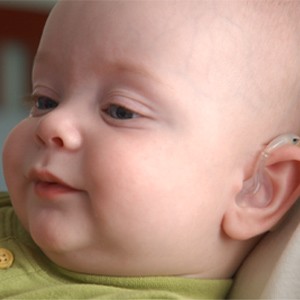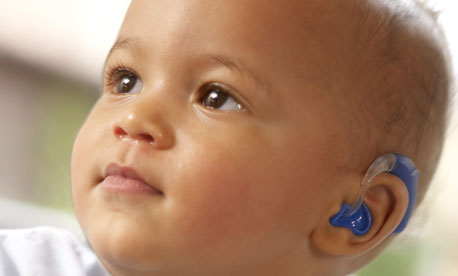As professionals in the speech and hearing field, we understand that your family is going through some major changes after learning about your child's hearing loss. We are here to help you adjust to this new part of your lives. When you leave the hospital or the audiology clinic, it is perfectly normal to feel over overwhelmed with all of the new information you are given. As you are quickly realizing, there are a number of decisions that need to be made and some of them must be made sooner than others. At the same time, you are probably overcome with a number of emotions and other responses to your and your child's situation. You may be wondering: Am I all alone? That is what this page is for. We want you to know that no matter what you are experiencing now or what you may experience in the future, you are never alone. |  Today's hearing technology is amazing. Oftentimes, a child's hearing aid devices are virtually invisible.Image obtained from http://www.cdc.gov/ncbddd/dd/new_images/Hearingbaby.jpg |
 A time of grief is also likely to happen, which combines the feelings of anger, guilt, and sadness. Guilt and anger are among the most pervasive feelings that parents face. You may search for someone or something to blame for your child's hearing loss, including yourself. Spending time with or talking to families in similar situations can help alleviate these emotions and social isolation. (See our Blog to connect with families like you.) Eventually, parents and family members will come to a realization stage in which they accept the fact that their child's hearing loss is a reality. This is when you will usually start addressing the issue head-on. It is OK to feel uncertain or awkward at first as you start learning how to best work with your child. You'll gradually find yourself being more receptive to the information given to you by members your child's healthcare team.  Image obtained from http://www.letthemhear.org/images/misc/Boy-with-Cochlear-Implant.jpg | Many researchers have looked into the emotional journey that parents go through following the diagnosis of their child's communication disorder. For many families, the first reaction is shock. You may feel a sense of panic and disorganization. Your family, as you once knew it, no longer may seem to exist. Next, some families undergo a period of denial, in which they choose not to believe that their child's condition is real or they retreat away from the condition, such as avoiding doctor's appointments. Although this experience is normal, parents are advised not to linger here because it delays your ability to focus on the intervention process.  Image obtained from http://www.wtvq.com/images/news/HEALTH/hearing%20aid%20child.jpg Finally, there will come a time of closure and full acknowledgment of your child's condition. Slowly but surely you are arriving at a relatively constant state of peace towards your child's hearing abilities and inabilities. You discover a sense of resolve and endurance. This full acceptance of your child's hearing loss is critical. It is quite likely that, as your child grows up, there will be frequent reminders that your child is different from his or her peers. It is important to remember, however, that differences are not necessarily disadvantages. If you refuse to accept that this is your and your child's reality, you will inevitably be disappointed whenever those moments occur. Being able to move beyond the hearing deficit itself will allow you to recognize all that your child is still fully capable of doing. |
Information for this page was adapted from:
Fortier, L. M. & Wanlass, R. L. (1984). Family crisis following the diagnosis of a handicapped child. Family Relations 33(1), 13-24.
Kendall, D. L. (2000). Counseling in communication disorders. Contemporary Issues in Communication Sciences and Disorders 27, 96-103.
Krutzer-White, E. & Luterman, D. (2003). Families and children with hearing loss: Grief and coping. Mental Retardation and Development: Disabilities Research Reviews 9, 232-5.